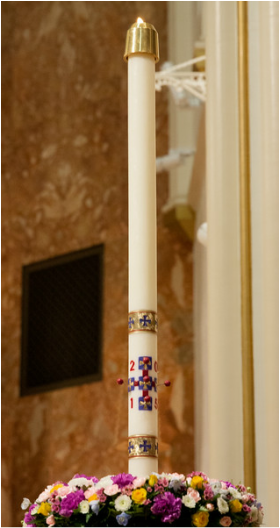
For example, people of faith recognize the need to pray. There are instances when the numerous demands of life can be an obstacle to our prayer time. Many of these situations are legitimate. Caring for the needs of our children or for a loved one who is sick, assisting elderly parents or a multitude of other possible scenarios quickly come to mind. Sometimes service and charity will be our prayer. However, there are times when we fail to pray simply out of a lack of discipline. The clear path to a lesser goal is plopping on the coach and finding the remote control instead of going to one’s room and praying to the Father in secret.
Most of us have heard the old maxim, “The road to hell is paved with good intentions.” Now that we have completed the Octave of Easter, may we take some time to reflect back on Lent? How did you grow in your spiritual life during the season of Lent? Were those 40 days extremely beneficial to your spiritual vitality? What were your Lenten resolutions (intentions)? Were you faithful at sticking to them or did clear paths to lesser goals reveal themselves repeatedly?
Taking time to reflect upon major events in life or major liturgical seasons is important for continued growth. We have to see where we have been, where we currently are, and where we hope to go before we can make formidable plans for the future. God calls each of us to be great saints, but if we never put forth any effort into this endeavor we may simply find ourselves wandering around for 40 years or more as did the people of old. Our relationship with Jesus Christ is too important to be left up to chance.
I believe it is vital for Church leadership to also spend significant time in reflection and evaluation after major liturgical seasons. What went well? What needs significant work? What do we need to add? What do we need to stop doing? In regard to the liturgical celebrations during these holiest of days, I quickly made notes of some of things that deserve more attention in the future. If we made mistakes, I don’t want to repeat the same errors two years in a row. If we can enhance part of the Sacred Liturgy by paying closer attention to some details I want to be sure we do that. I don’t want to settle for mediocrity in our prayer and worship.
In regard to learning opportunities, what types of offerings were made available to God’s people during the season of Lent? Church leadership can get discouraged when programs are offered and very few people show up. The reality is that we can’t force people to come. We can only invite. Did we invite well? Were the programs scheduled at good times? Was childcare offered? Was the content of the programs offered pertinent to the lives of the people? I don’t simply want to offer a program so that we can say we did something. I want it to be relevant, of high quality, and inspirational. If it does not motivate people to grow in their relationship with God, then what is the point? Milton Friedman said, “One of the great mistakes is to judge policies and programs by their intentions rather than their results.” I want our intentions to good and holy, but I also hope our endeavors to bear great fruit. We trust in the grace of God and the power of the Holy Spirit, but I want to be sure we are doing our part as well.
I hope the season of Lent was wonderful for you and that you now have a blessed Easter season. (We celebrate for 50 days.) If your Lent was less than you had hoped, make sure your Easter season bears great fruit. These are marvelous days and the Scripture readings chosen for the Easter season point to hope, joy, and peace.
May our hearts and our minds echo the words of Thomas,
“My Lord and my God!”
 RSS Feed
RSS Feed
